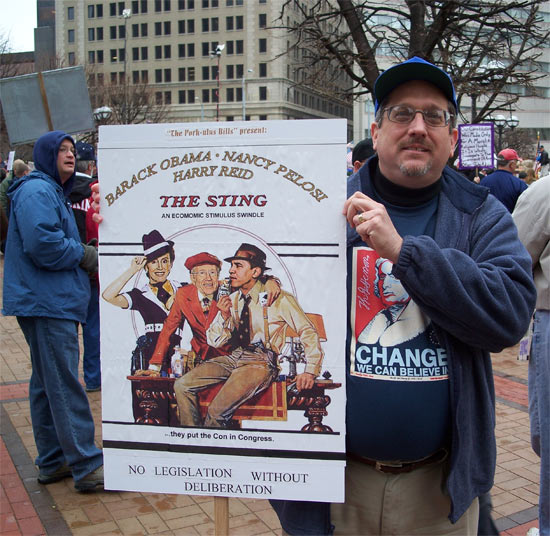
Barack Obama wanted “Change.” Meanwhile, populists on the right and left alike are demanding “Real Change,” and are directing their anger at “The Establishment” in Washington.
Once again, everything is new. It’s almost exactly eighteen 18 months since America succumbed to the intoxication of change. “Change” was the promise an ever-smiling young man used to charm his nation. Barack Obama’s electoral victory gave many Americans a reason to believe that their great nation could be reborn and that they could rediscover themselves.
Now, eighteen months later, the magic word has turned against Obama the magician and against all Washington as well: Populists on the right, as well as on the left, are demanding “real change” and are directing their anger toward “The Establishment” in their nation’s capital.
So does this mean a national shift to the right? Only someone who, in November 2008, made the mistake of believing that America had taken a turn to the left with Obama’s election would come to that definite, over-simplified (and so demonstrably wrong) conclusion. Many surrendered to that bit of wishful thinking — many Democrats in America, as well as many observers of all stripes here in Europe. But they all simply underestimated the people’s desire to put the eight-year George Bush era behind them. America was looking for the anti-Bush; America found Obama.
While the President is still respected, gone are the days when the people praised the first black man in the White House almost as a demigod. But most Americans still view their president sympathetically. It’s not the man, but his policies that makes many citizens uncomfortable and drives some of them to the barricades.
The loud voice of the so-called tTea pParty movement is just one, albeit the most colorful, facet of this opposition. Still, one-fifth of U.S. society supports this right-wing surge that has raged for a year in the streets and in town meetings. The members are almost exclusively older white males with above-average educations and incomes. George W. Bush himself was already too liberal for their tastes.
In the final analysis, it was the Republicans at the outset of the financial crisis in the fall of 2008 who (against all party principles) helped the bankers and the Wall Street big shots with billions in loans. Right-wing anger grew to outrage when Obama introduced a gigantic recovery plan financed with more borrowing and then forced his health care reform plans through. Since then, a ghost has been wandering the halls of the White House — the specter of socialism.
Obama need not fear the fantasies entertained by tTea Pparty members. On the contrary, seen purely from a short-term election standpoint, this movement could actually help Obama and the Democrats in the November congressional elections. The conservative rebellion has resulted in a purgatory for Republicans, forcing them to nominate increasingly conservative candidates true to the tea party Tea Party line. It’s precisely this radicalization that could keep many independents from voting for the opposition in November.
The Real Danger for Obama
The real danger Obama faces lurks mainly in the center because there, too, there’s long been a fear of the leviathan, the all-powerful state. Nearly one in every three Americans considers the state a “great threat.” Never before have so few citizens (22 percent) expressed so little confidence in Washington. The frustration, the rage against “those up there” has affected nearly every institution. The reputations of banks and corporations, media outlets and labor unions have been ruined just like the image of any government.
It seems Obama is the victim of a paradox: His greatest successes thus far — an economic recovery program for the global economic crisis and a health care program for Americans — have awakened primal fears throughout the nation. As in Germany, Americans suffer a fearful allergic reaction to increasing national debt. Germans instinctively recall inflation and the Weimar government, while in the United States they long for the good old days when America reigned supreme and the West was totally free — supposedly.
In the end, it was Ronald Reagan who got Americans to believe in their own myths once again. Even Barack Obama said he wanted to compare his administration to that of the Republican’s hero and lead the nation in a new direction. But the economic crisis didn’t give him time to gain the people’s trust in him or in their nation. His administration had to act as quickly as possible, and now it suffers from the problem that his reforms won’t pay off quickly enough, and that the people will have to wait for millions of new jobs and social equality.
Obama wants to show that government isn’t the source of all evil. Unless he is able to do so soon, however, the next big change will hound him out of office.

Leave a Reply
You must be logged in to post a comment.